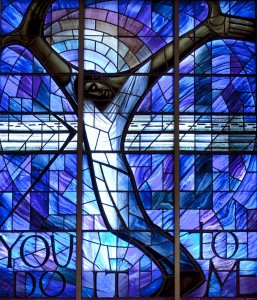By Christine Moolo, Manager of LMDJ Ministry Services, The Evangelical Covenant Church
Leaning In. My thought-life did a 180 degree turn when I stepped on the Sankofa bus a few years back. Before I participated in the ECC’s Sankofa Journey I thought I “got it”. I had a heart for social justice, I had studied international development and was very familiar with concepts and practices of local leadership and asset-based community development. I read the right authors, frequently threw around the word “empower” and had an ethnically diverse group of friends. I would never have said I had “arrived” in my understanding of the nature of injustice, but inside, I thought I was on the right track.
God used the Sankofa Journey to help me see myself clearly, perhaps for the first time. It is often the response of white folks on the Sankofa Journey to come away from their experience saying “I feel guilty”, “I didn’t know”, “I have so much to learn about systemic racism and injustice.” I shared all of these sentiments! But what I have learned in subsequent years is that I am only contributing to the problem if I continue to live with those same sentiments. I have to ACT. I have to be informed, I have to start listening to the voices that I had subconsciously and consciously tuned out. I have to tell my friends and neighbors truths as they are revealed to me. I can no longer use the crutch of “I didn’t know” because I am actively on the path to learning more. I can’t say “I feel guilty” either. Guilt is a product of knowing our personal and corporate participation in acts of oppression, and doing nothing to change that reality. As soon as we become active participants in the struggle for equity, we begin the process of shedding that old skin of guilt.
Issues of race can feel complex and overwhelming. But the starting point is surprisingly simple. We have to be willing to be learners. We must remind ourselves that we are not the experts on everything. This shouldn’t be so hard people! For myself, I learn best by leaning in. I make an effort to put myself in the proximity of people I can learn a great deal from: Civil Rights Activists, Black Lives Matter Proponents, Arabic Community Organizers, Gender Equity Commissioners, Doctrine of Discovery Refuters, the list goes on. I do A LOT of listening. I write down the authors and artists that my friends of color recommend. I listen to news from sources I hadn’t before. I watch movies and TV shows where the stars are non-white. I live with the fact that I am always learning, always ready to eat another slice of that proverbial humble pie.
I would like to share a couple profound moments of learning I have had since that bus ride. They reveal that I am an imperfect work in progress (shock!) but my hope in sharing is that you too might have an “ah-ha” moment, even if that moment is, for my friends of color “Thank you Jesus, there is one less white person I have to explain this to!”
This hits home. A friend shared with me about being a student at North Park University and feeling invisible as an African-American woman. She noticed how white students always seemed to be fascinated by African students, or other foreign students. She asked, “Why would the white students look through me like I didn’t exist?” Hearing this was like a punch in the stomach. I had been a white undergraduate student at North Park. I had friends from South America, from Alaska, from Africa. I did not have one close African-American friend for the duration of my three years at NPU. Why? Was that purely by accident? If I am honest with myself, that was no accident. I was raised to be fearful of African-American people, whether I would have admitted that or not. I noticed that African-American students sat at their own table in ARA, but I didn’t question why they were separate from me. I didn’t have to think about why, so I didn’t. When I look back at my high school and college photos, I mostly see white. White friends, white professors, white life. How did that happen? I didn’t think I was racist. I told myself, “there wasn’t much diversity where I grew up”. This forced me to face a more complex question: Why were there primarily white people in my community? I have uncovered that this too was not an accident. Housing policies, red-lining, wealth gaps and raw fear have driven wedges between ethnic communities, benefiting white communities at the expense of communities of color. The wealth, safety and opportunity I have experienced every day of my life is at the direct expense of and detriment to black and brown people. So while I am may not have consciously chosen my monocultural tendencies, I, along with you all, have been thrown into the pit of racism from day one. But now that we know, it’s up to us to climb our way out and make a path for our friends and family to do the same.
Prophetic words. I was sitting in a racial reconciliation seminar, when a young white woman spoke up: “Talking about race makes me uncomfortable. I am always worried I will say the wrong thing and offend someone.” I nodded in agreement. I too am a person longing for healthy relationships across race, but I fear that being myself will push people away from me, that I will be seen as ignorant or racist. A black community leader responded to this young woman, “It is a privilege to have a choice to be uncomfortable or not. As a black man, I don’t have that choice. I have to live and work in a society that does not welcome me as I am. I am constantly uncomfortable, but I have to be in order to survive. You can step in and out of your comfort zone as you please. You can decide whether you want to engage with the black community, or retreat to your safe white zone where you won’t have to feel uncomfortable talking about race again.” Ouch. The truth hurts! From the moment I internalized those prophetic words I committed myself to engage – to continue to learn and grow in my understanding of our racialized society and the history that brought us to where we are today. I have a responsibility to my brothers and sisters of color to understand their daily realities. I commit to being uncomfortable. I will get over that feeling, and move on with the Kingdom work God has called me to. And I am already seeing that my discomfort has transformed itself into wide blessings and deep friendships.
It isn’t easy. But it’s good. And it’s what Jesus taught us.
“Love must be sincere. Hate what is evil; cling to what is good. Be devoted to one another in love. Honor one another above yourselves. Never be lacking in zeal, but keep your spiritual fervor, serving the Lord. Be joyful in hope, patient in affliction, faithful in prayer. Share with the Lord’s people who are in need. Practice hospitality. Bless those who persecute you; bless and do not curse. Rejoice with those who rejoice; mourn with those who mourn. Live in harmony with one another.” Romans 12:9-16


